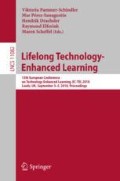Abstract
The recent focus on learning analytics to analyse temporal dimensions of learning holds a strong promise to provide insights into latent constructs such as learning strategy, self-regulated learning, and metacognition. There is, however, a limited amount of research in temporally-focused process mining in educational settings. Building on a growing body of research around event-based data analysis, we explore the use of process mining techniques to identify strategic and tactical learner behaviours. We analyse trace data collected in online activities of a sample of nearly 300 computer engineering undergraduate students enrolled in a course that followed a flipped classroom pedagogy. Using a process mining approach based on first order Markov models in combination with unsupervised machine learning methods, we performed intra- and inter-strategy analysis. We found that certain temporal activity traits relate to performance in the summative assessments attached to the course, mediated by strategy type. Results show that more strategically minded activity, embodying learner self-regulation, generally proves to be more successful than less disciplined reactive behaviours.
Access this chapter
Tax calculation will be finalised at checkout
Purchases are for personal use only
References
O’Flaherty, J., Phillips, C., Karanicolas, S., Snelling, C., Winning, T.: The use of flipped classrooms in higher education: a scoping review. Internet High. Educ. 25, 85–95 (2015). https://doi.org/10.1016/j.iheduc.2015.02.002
Gašević, D., Jovanović, J., Pardo, A., Dawson, S.: Detecting learning strategies with analytics: links with self-reported measures and academic performance. J. Learn. Anal. 4, 113–128 (2017). https://doi.org/10.18608/jla.2017.42.10
Jovanović, J., Gašević, D., Dawson, S., Pardo, A., Mirriahi, N.: Learning analytics to unveil learning strategies in a flipped classroom. Internet High. Educ. 33, 74–85 (2017). https://doi.org/10.1016/j.iheduc.2017.02.001
Kovanović, V., Gašević, D., Joksimović, S., Hatala, M., Adesope, O.: Analytics of communities of inquiry: effects of learning technology use on cognitive presence in asynchronous online discussions. Internet High. Educ. 27, 74–89 (2015). https://doi.org/10.1016/j.iheduc.2015.06.002
Lust, G., Vandewaetere, M., Ceulemans, E., Elen, J., Clarebout, G.: Tool-use in a blended undergraduate course: in search of user profiles. Comput. Educ. 57, 2135–2144 (2011). https://doi.org/10.1016/j.compedu.2011.05.010
Kovanović, V., Gašević, D., Dawson, S., Joksimović, S., Baker, R.S., Hatala, M.: Does time-on-task estimation matter? Implications for the validity of learning analytics findings. J. Learn. Anal. 2, 81–110 (2015). https://doi.org/10.18608/jla.2015.23.6
Fincham, O.E., Gasevic, D.V., Jovanovic, J.M., Pardo, A.: From study tactics to learning strategies: an analytical method for extracting interpretable representations. IEEE Trans. Learn. Technol. 1–13 (2018). https://doi.org/10.1109/tlt.2018.2823317
Zimmerman, B.J.: A social cognitive view of self-regulated academic learning. J. Educ. Psychol. 81, 329–339 (1989). https://doi.org/10.1037//0022-0663.81.3.329
Boekaerts, M.: Self-regulated learning: a new concept embraced by researchers, policy makers, educators, teachers, and students. Learn. Instr. 7, 161–186 (1997). https://doi.org/10.1016/S0959-4752(96)00015-1
Butler, D.L., Winne, P.H.: Feedback and self-regulated learning: a theoretical synthesis. Rev. Educ. Res. 65, 245–281 (1995). https://doi.org/10.3102/00346543065003245
Jamieson-Noel, D., Winne, P.H.: Exploring students’ calibration of self reports about study tactics and achievement. Contemp. Educ. Psychol. 27, 551–572 (2002). https://doi.org/10.1016/S0361-476X(02)00006-1
Bjork, R.A., Dunlosky, J., Kornell, N.: Self-regulated learning: beliefs, techniques, and illusions. Annu. Rev. Psychol. 64, 417–444 (2013). https://doi.org/10.1146/annurev-psych-113011-143823
Winne, P.H.: A metacognitive view of individual differences in self-regulated learning. Learn. Individ. Differ. 8, 327–353 (1996). https://doi.org/10.1016/S1041-6080(96)90022-9
Lust, G., Elen, J., Clarebout, G.: Regulation of tool-use within a blended course: student differences and performance effects. Comput. Educ. 60, 385–395 (2013). https://doi.org/10.1016/j.compedu.2012.09.001
Kinnebrew, J.S., Biswas, G.: Identifying learning behaviors by contextualizing differential sequence mining with action features and performance evolution. In: Proceedings of the 5th International Conference on Educational Data Mining (EDM 2012), pp. 57–64 (2012)
Kinnebrew, J.S., Segedy, J.R., Biswas, G.: Analyzing the temporal evolution of students’ behaviors in open-ended learning environments. Metacognition Learn. 9, 187–215 (2014). https://doi.org/10.1007/s11409-014-9112-4
Bannert, M., Reimann, P., Sonnenberg, C.: Process mining techniques for analysing patterns and strategies in students’ self-regulated learning. Metacognition Learn. 9, 161–185 (2014). https://doi.org/10.1007/s11409-013-9107-6
Sonnenberg, C., Bannert, M.: Discovering the effects of metacognitive prompts on the sequential structure of SRL-processes using process mining techniques. J. Learn. Anal. 2, 72–100 (2015)
Gabadinho, A., Ritschard, G., Mueller, N.S., Studer, M.: Analyzing and visualizing state sequences in R with TraMineR. J. Stat. Softw. 40, 1–37 (2011). https://doi.org/10.18637/jss.v040.i04
van der Aalst, W.: Process Mining: Data Science in Action. Springer, Heidelberg (2016). https://doi.org/10.1007/978-3-662-49851-4
Gatta, R., et al.: Generating and comparing knowledge graphs of medical processes using pMineR. In: Proceedings of the Knowledge Capture Conference 2017, Austin, Texas (2017)
Gatta, R., et al.: pMineR: an innovative R library for performing process mining in medicine. In: ten Teije, A., Popow, C., Holmes, J.H., Sacchi, L. (eds.) 16th Conference on Artificial Intelligence in Medicine, AIME 2017, Vienna (2017)
Author information
Authors and Affiliations
Corresponding author
Editor information
Editors and Affiliations
Rights and permissions
Copyright information
© 2018 Springer Nature Switzerland AG
About this paper
Cite this paper
Saint, J., Gašević, D., Pardo, A. (2018). Detecting Learning Strategies Through Process Mining. In: Pammer-Schindler, V., Pérez-Sanagustín, M., Drachsler, H., Elferink, R., Scheffel, M. (eds) Lifelong Technology-Enhanced Learning. EC-TEL 2018. Lecture Notes in Computer Science(), vol 11082. Springer, Cham. https://doi.org/10.1007/978-3-319-98572-5_29
Download citation
DOI: https://doi.org/10.1007/978-3-319-98572-5_29
Published:
Publisher Name: Springer, Cham
Print ISBN: 978-3-319-98571-8
Online ISBN: 978-3-319-98572-5
eBook Packages: Computer ScienceComputer Science (R0)

